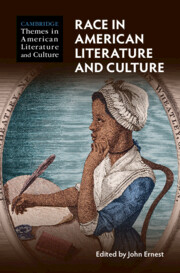Book contents
- Race in American Literature and Culture
- Cambridge Themes in American Literature and Culture
- Race in American Literature and Culture
- Copyright page
- Contents
- Contributors
- Acknowledgments
- Introduction
- Part I Fractured Foundations
- Chapter 1 American Empire
- Chapter 2 Synchronic and Diachronic
- Chapter 3 Protean Oceans
- Part II Racial Citizenship
- Part III Contending Forces
- Part IV Reconfigurations
- Part V Envisioning Race
- Part VI Case Studies
- Part VII Reflections and Prospects
- Index
Chapter 1 - American Empire
from Part I - Fractured Foundations
Published online by Cambridge University Press: 26 May 2022
- Race in American Literature and Culture
- Cambridge Themes in American Literature and Culture
- Race in American Literature and Culture
- Copyright page
- Contents
- Contributors
- Acknowledgments
- Introduction
- Part I Fractured Foundations
- Chapter 1 American Empire
- Chapter 2 Synchronic and Diachronic
- Chapter 3 Protean Oceans
- Part II Racial Citizenship
- Part III Contending Forces
- Part IV Reconfigurations
- Part V Envisioning Race
- Part VI Case Studies
- Part VII Reflections and Prospects
- Index
Summary
“American Empire” explores how the interplay between imperialism and race shaped early American politics, literature, and culture. Through a series of close readings of works by Phillis Wheatley, J. Hector St. John de Crèvecœur, William Apess, and James Fenimore Cooper, the essay shows how early American writers wrestled with the continuities and discontinuities between some of the most important concepts that shaped the young republic, in particular the tensions between democracy, empire, freedom, slavery, and race. These internal contradictions between the ideals espoused in political documents such as the Declaration of Independence, the US Constitution, and The Federalist, and the policies of racial exploitation and dispossession that drove the nation’s expansionist economic agenda, would come to shape the most important literary works of the day. Writers like Wheatley, Crèvecœur, Apess, and Cooper would seek to make sense of those contradictions in their writings, a legacy that would carry on through the nineteenth century and into the current moment.
- Type
- Chapter
- Information
- Race in American Literature and Culture , pp. 11 - 25Publisher: Cambridge University PressPrint publication year: 2022

